Orientation for Success in Higher Education: Reflective Learning
VerifiedAdded on 2023/06/18
|7
|2294
|444
Essay
AI Summary
This essay discusses the concept of orientation for success in higher education, emphasizing its importance for students' professional and personal development. It reflects on the impacts of COVID-19 on the hospitality, travel, and leisure sectors, highlighting challenges such as low productivity, workforce problems, and financial difficulties. The essay also describes the use of formative feedback in improving summative assessments, including enhancing knowledge, skills, and understanding. Furthermore, it identifies cultural and behavioral expectations for business and management students, such as positive diversification and polite communication. The importance of peer-to-peer support and team working is explained, noting benefits like complementary strengths and conflict resolution skills. The essay concludes by reinforcing the significance of these elements in achieving success in higher education, promoting academic integrity, and developing transferable skills.
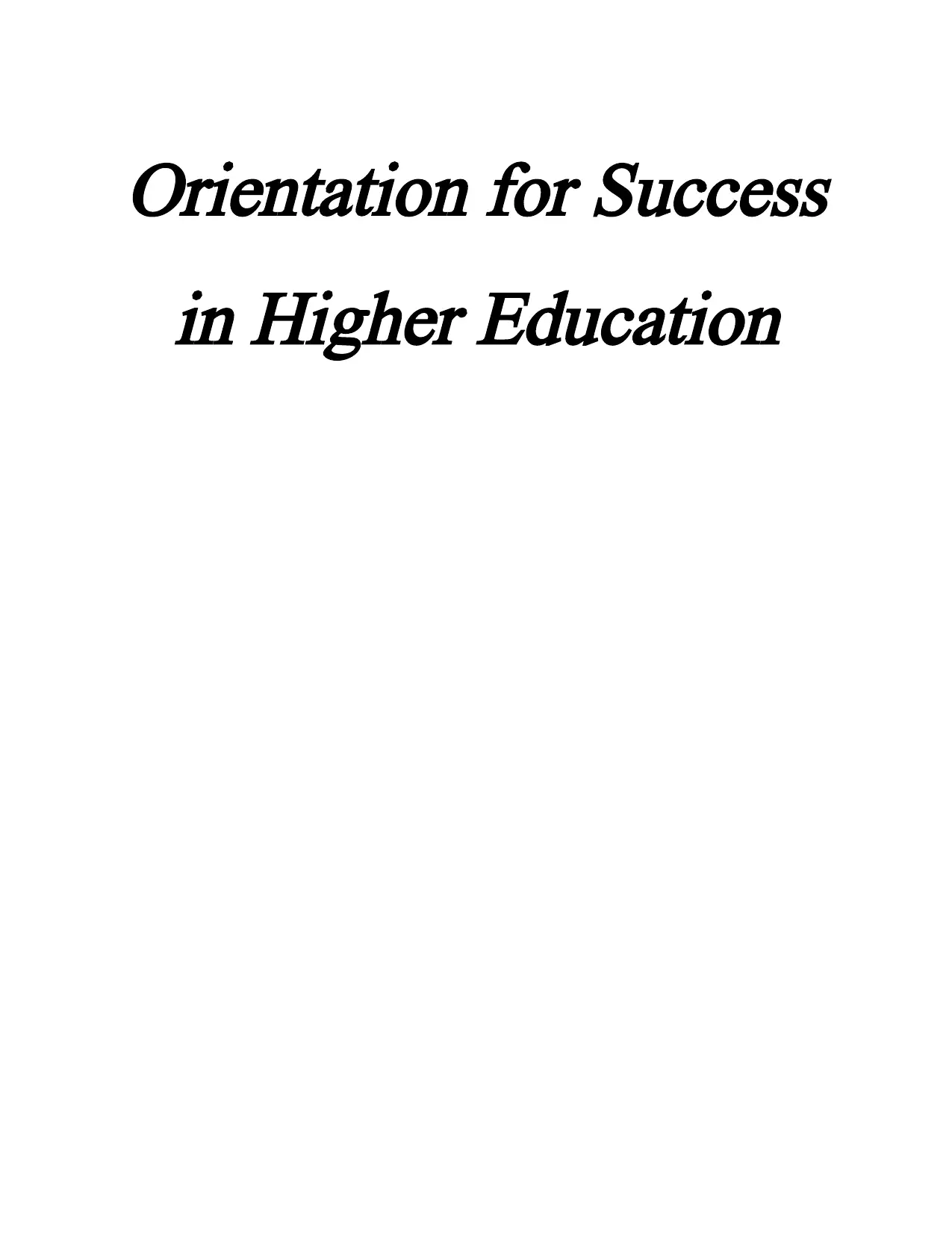
Orientation for Success
in Higher Education
in Higher Education
Paraphrase This Document
Need a fresh take? Get an instant paraphrase of this document with our AI Paraphraser
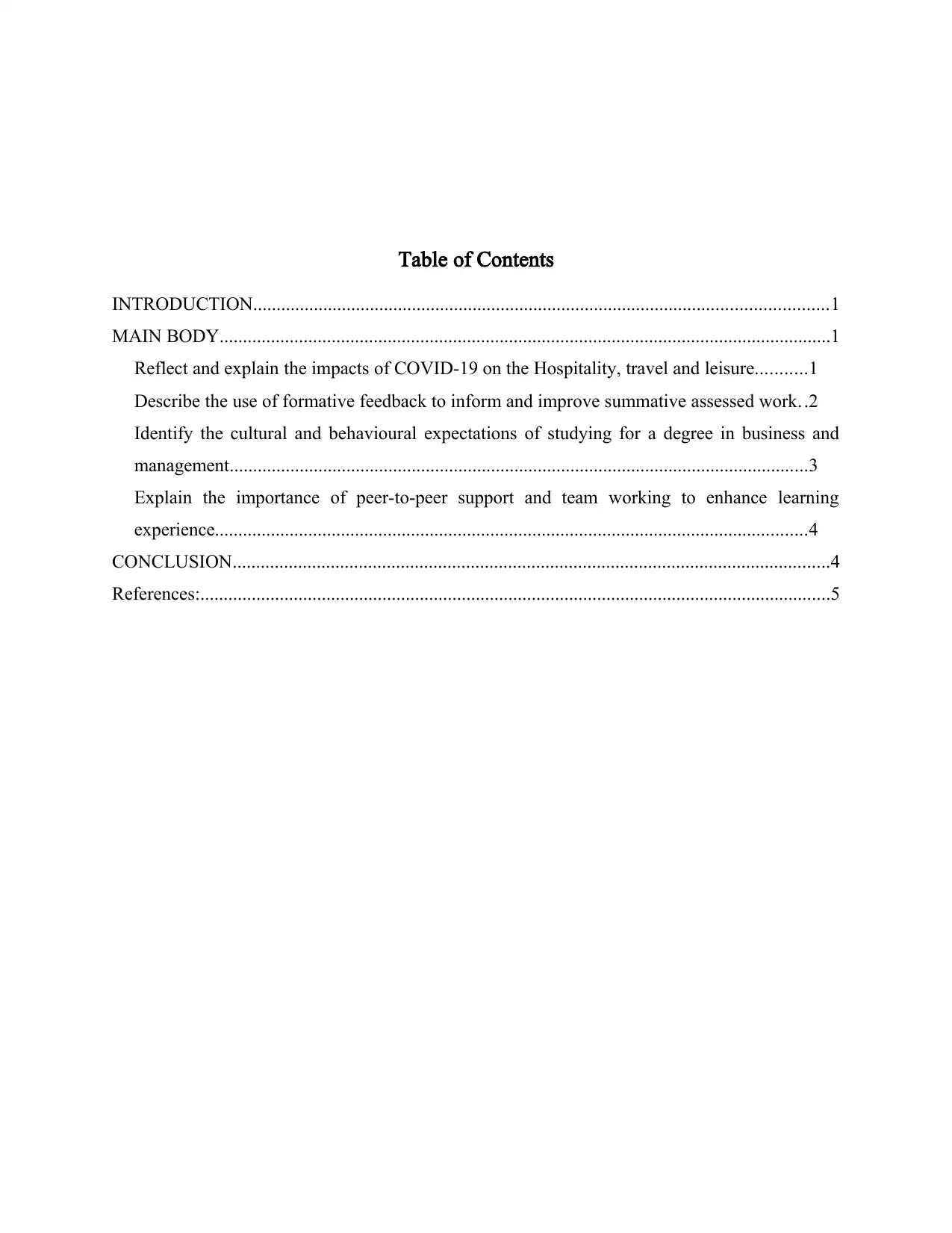
Table of Contents
INTRODUCTION...........................................................................................................................1
MAIN BODY...................................................................................................................................1
Reflect and explain the impacts of COVID-19 on the Hospitality, travel and leisure...........1
Describe the use of formative feedback to inform and improve summative assessed work..2
Identify the cultural and behavioural expectations of studying for a degree in business and
management............................................................................................................................3
Explain the importance of peer-to-peer support and team working to enhance learning
experience...............................................................................................................................4
CONCLUSION................................................................................................................................4
References:.......................................................................................................................................5
INTRODUCTION...........................................................................................................................1
MAIN BODY...................................................................................................................................1
Reflect and explain the impacts of COVID-19 on the Hospitality, travel and leisure...........1
Describe the use of formative feedback to inform and improve summative assessed work..2
Identify the cultural and behavioural expectations of studying for a degree in business and
management............................................................................................................................3
Explain the importance of peer-to-peer support and team working to enhance learning
experience...............................................................................................................................4
CONCLUSION................................................................................................................................4
References:.......................................................................................................................................5
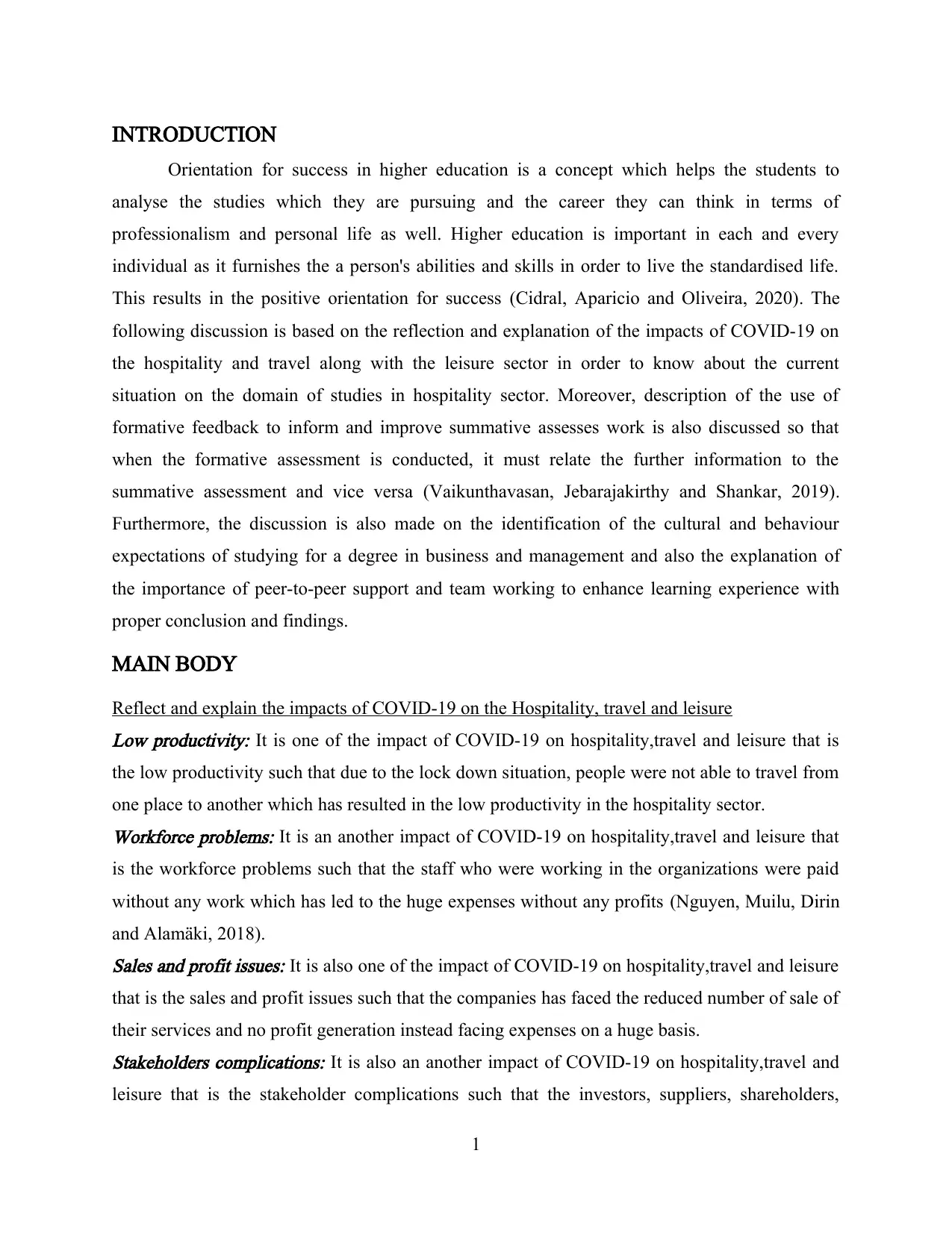
INTRODUCTION
Orientation for success in higher education is a concept which helps the students to
analyse the studies which they are pursuing and the career they can think in terms of
professionalism and personal life as well. Higher education is important in each and every
individual as it furnishes the a person's abilities and skills in order to live the standardised life.
This results in the positive orientation for success (Cidral, Aparicio and Oliveira, 2020). The
following discussion is based on the reflection and explanation of the impacts of COVID-19 on
the hospitality and travel along with the leisure sector in order to know about the current
situation on the domain of studies in hospitality sector. Moreover, description of the use of
formative feedback to inform and improve summative assesses work is also discussed so that
when the formative assessment is conducted, it must relate the further information to the
summative assessment and vice versa (Vaikunthavasan, Jebarajakirthy and Shankar, 2019).
Furthermore, the discussion is also made on the identification of the cultural and behaviour
expectations of studying for a degree in business and management and also the explanation of
the importance of peer-to-peer support and team working to enhance learning experience with
proper conclusion and findings.
MAIN BODY
Reflect and explain the impacts of COVID-19 on the Hospitality, travel and leisureLow productivity: It is one of the impact of COVID-19 on hospitality,travel and leisure that is
the low productivity such that due to the lock down situation, people were not able to travel from
one place to another which has resulted in the low productivity in the hospitality sector.Workforce problems: It is an another impact of COVID-19 on hospitality,travel and leisure that
is the workforce problems such that the staff who were working in the organizations were paid
without any work which has led to the huge expenses without any profits (Nguyen, Muilu, Dirin
and Alamäki, 2018).Sales and profit issues: It is also one of the impact of COVID-19 on hospitality,travel and leisure
that is the sales and profit issues such that the companies has faced the reduced number of sale of
their services and no profit generation instead facing expenses on a huge basis.Stakeholders complications: It is also an another impact of COVID-19 on hospitality,travel and
leisure that is the stakeholder complications such that the investors, suppliers, shareholders,
1
Orientation for success in higher education is a concept which helps the students to
analyse the studies which they are pursuing and the career they can think in terms of
professionalism and personal life as well. Higher education is important in each and every
individual as it furnishes the a person's abilities and skills in order to live the standardised life.
This results in the positive orientation for success (Cidral, Aparicio and Oliveira, 2020). The
following discussion is based on the reflection and explanation of the impacts of COVID-19 on
the hospitality and travel along with the leisure sector in order to know about the current
situation on the domain of studies in hospitality sector. Moreover, description of the use of
formative feedback to inform and improve summative assesses work is also discussed so that
when the formative assessment is conducted, it must relate the further information to the
summative assessment and vice versa (Vaikunthavasan, Jebarajakirthy and Shankar, 2019).
Furthermore, the discussion is also made on the identification of the cultural and behaviour
expectations of studying for a degree in business and management and also the explanation of
the importance of peer-to-peer support and team working to enhance learning experience with
proper conclusion and findings.
MAIN BODY
Reflect and explain the impacts of COVID-19 on the Hospitality, travel and leisureLow productivity: It is one of the impact of COVID-19 on hospitality,travel and leisure that is
the low productivity such that due to the lock down situation, people were not able to travel from
one place to another which has resulted in the low productivity in the hospitality sector.Workforce problems: It is an another impact of COVID-19 on hospitality,travel and leisure that
is the workforce problems such that the staff who were working in the organizations were paid
without any work which has led to the huge expenses without any profits (Nguyen, Muilu, Dirin
and Alamäki, 2018).Sales and profit issues: It is also one of the impact of COVID-19 on hospitality,travel and leisure
that is the sales and profit issues such that the companies has faced the reduced number of sale of
their services and no profit generation instead facing expenses on a huge basis.Stakeholders complications: It is also an another impact of COVID-19 on hospitality,travel and
leisure that is the stakeholder complications such that the investors, suppliers, shareholders,
1
⊘ This is a preview!⊘
Do you want full access?
Subscribe today to unlock all pages.

Trusted by 1+ million students worldwide
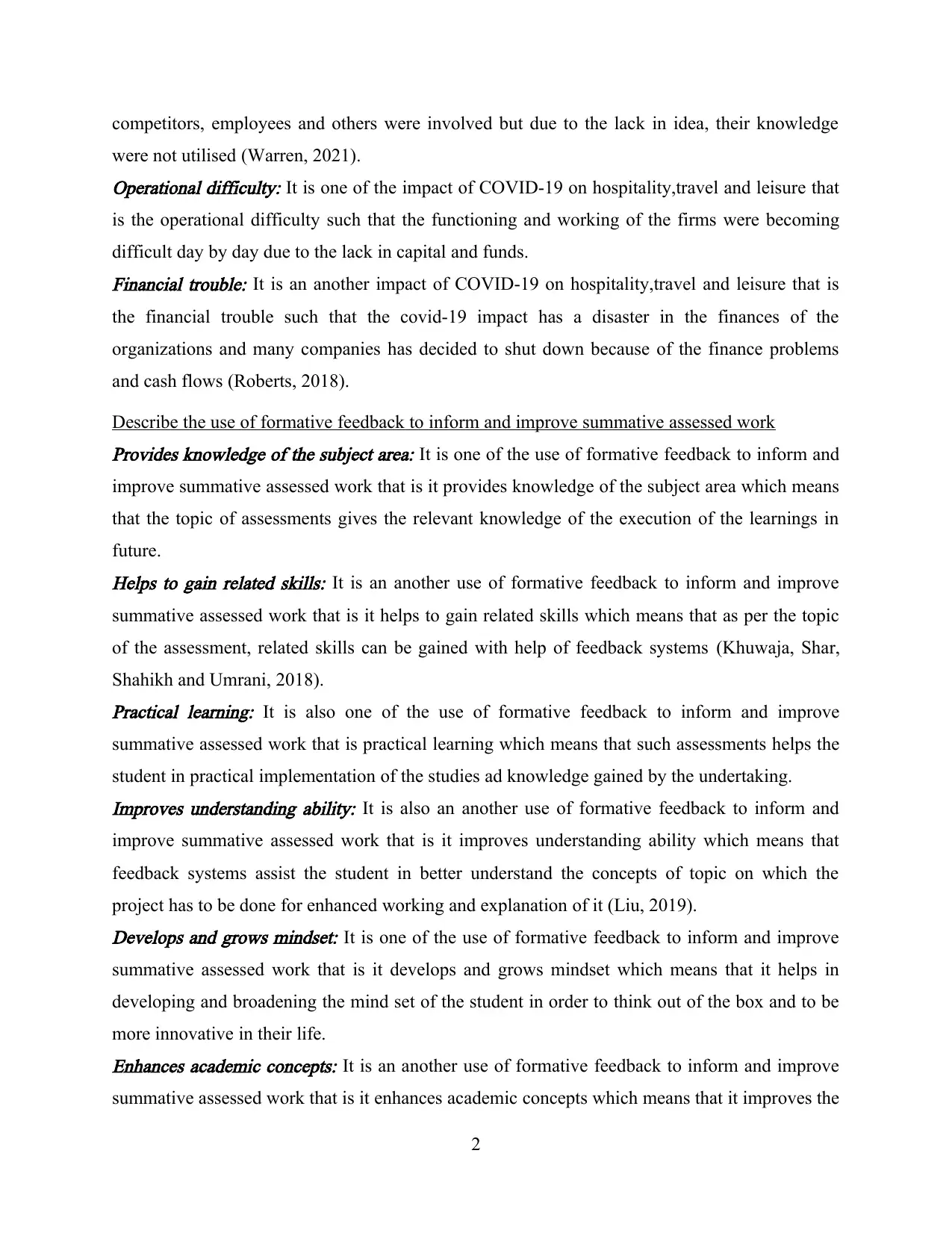
competitors, employees and others were involved but due to the lack in idea, their knowledge
were not utilised (Warren, 2021).Operational difficulty: It is one of the impact of COVID-19 on hospitality,travel and leisure that
is the operational difficulty such that the functioning and working of the firms were becoming
difficult day by day due to the lack in capital and funds.Financial trouble: It is an another impact of COVID-19 on hospitality,travel and leisure that is
the financial trouble such that the covid-19 impact has a disaster in the finances of the
organizations and many companies has decided to shut down because of the finance problems
and cash flows (Roberts, 2018).
Describe the use of formative feedback to inform and improve summative assessed workProvides knowledge of the subject area: It is one of the use of formative feedback to inform and
improve summative assessed work that is it provides knowledge of the subject area which means
that the topic of assessments gives the relevant knowledge of the execution of the learnings in
future.Helps to gain related skills: It is an another use of formative feedback to inform and improve
summative assessed work that is it helps to gain related skills which means that as per the topic
of the assessment, related skills can be gained with help of feedback systems (Khuwaja, Shar,
Shahikh and Umrani, 2018).Practical learning: It is also one of the use of formative feedback to inform and improve
summative assessed work that is practical learning which means that such assessments helps the
student in practical implementation of the studies ad knowledge gained by the undertaking.Improves understanding ability: It is also an another use of formative feedback to inform and
improve summative assessed work that is it improves understanding ability which means that
feedback systems assist the student in better understand the concepts of topic on which the
project has to be done for enhanced working and explanation of it (Liu, 2019).Develops and grows mindset: It is one of the use of formative feedback to inform and improve
summative assessed work that is it develops and grows mindset which means that it helps in
developing and broadening the mind set of the student in order to think out of the box and to be
more innovative in their life.Enhances academic concepts: It is an another use of formative feedback to inform and improve
summative assessed work that is it enhances academic concepts which means that it improves the
2
were not utilised (Warren, 2021).Operational difficulty: It is one of the impact of COVID-19 on hospitality,travel and leisure that
is the operational difficulty such that the functioning and working of the firms were becoming
difficult day by day due to the lack in capital and funds.Financial trouble: It is an another impact of COVID-19 on hospitality,travel and leisure that is
the financial trouble such that the covid-19 impact has a disaster in the finances of the
organizations and many companies has decided to shut down because of the finance problems
and cash flows (Roberts, 2018).
Describe the use of formative feedback to inform and improve summative assessed workProvides knowledge of the subject area: It is one of the use of formative feedback to inform and
improve summative assessed work that is it provides knowledge of the subject area which means
that the topic of assessments gives the relevant knowledge of the execution of the learnings in
future.Helps to gain related skills: It is an another use of formative feedback to inform and improve
summative assessed work that is it helps to gain related skills which means that as per the topic
of the assessment, related skills can be gained with help of feedback systems (Khuwaja, Shar,
Shahikh and Umrani, 2018).Practical learning: It is also one of the use of formative feedback to inform and improve
summative assessed work that is practical learning which means that such assessments helps the
student in practical implementation of the studies ad knowledge gained by the undertaking.Improves understanding ability: It is also an another use of formative feedback to inform and
improve summative assessed work that is it improves understanding ability which means that
feedback systems assist the student in better understand the concepts of topic on which the
project has to be done for enhanced working and explanation of it (Liu, 2019).Develops and grows mindset: It is one of the use of formative feedback to inform and improve
summative assessed work that is it develops and grows mindset which means that it helps in
developing and broadening the mind set of the student in order to think out of the box and to be
more innovative in their life.Enhances academic concepts: It is an another use of formative feedback to inform and improve
summative assessed work that is it enhances academic concepts which means that it improves the
2
Paraphrase This Document
Need a fresh take? Get an instant paraphrase of this document with our AI Paraphraser
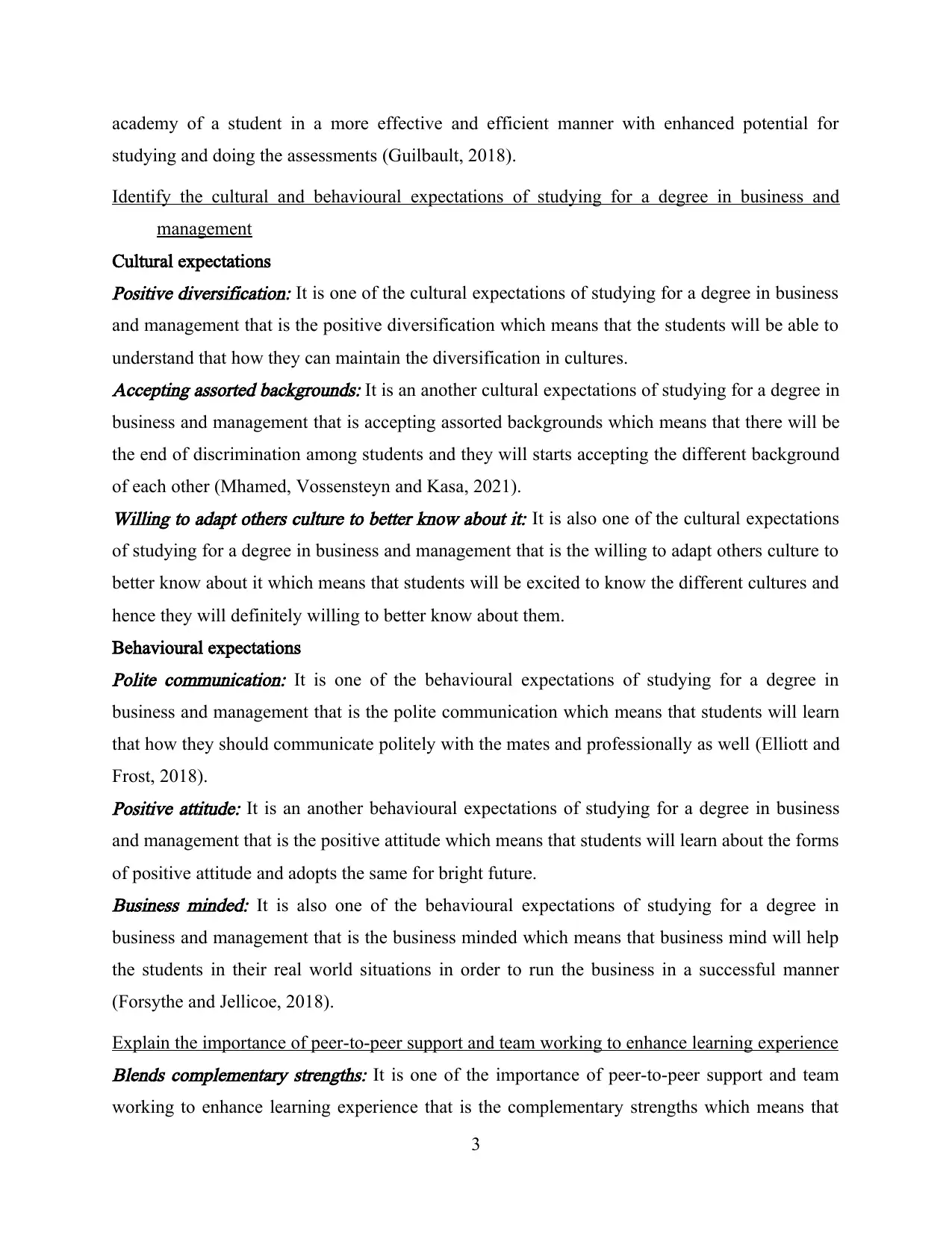
academy of a student in a more effective and efficient manner with enhanced potential for
studying and doing the assessments (Guilbault, 2018).
Identify the cultural and behavioural expectations of studying for a degree in business and
management
Cultural expectationsPositive diversification: It is one of the cultural expectations of studying for a degree in business
and management that is the positive diversification which means that the students will be able to
understand that how they can maintain the diversification in cultures.Accepting assorted backgrounds: It is an another cultural expectations of studying for a degree in
business and management that is accepting assorted backgrounds which means that there will be
the end of discrimination among students and they will starts accepting the different background
of each other (Mhamed, Vossensteyn and Kasa, 2021).Willing to adapt others culture to better know about it: It is also one of the cultural expectations
of studying for a degree in business and management that is the willing to adapt others culture to
better know about it which means that students will be excited to know the different cultures and
hence they will definitely willing to better know about them.
Behavioural expectationsPolite communication: It is one of the behavioural expectations of studying for a degree in
business and management that is the polite communication which means that students will learn
that how they should communicate politely with the mates and professionally as well (Elliott and
Frost, 2018).Positive attitude: It is an another behavioural expectations of studying for a degree in business
and management that is the positive attitude which means that students will learn about the forms
of positive attitude and adopts the same for bright future.Business minded: It is also one of the behavioural expectations of studying for a degree in
business and management that is the business minded which means that business mind will help
the students in their real world situations in order to run the business in a successful manner
(Forsythe and Jellicoe, 2018).
Explain the importance of peer-to-peer support and team working to enhance learning experienceBlends complementary strengths: It is one of the importance of peer-to-peer support and team
working to enhance learning experience that is the complementary strengths which means that
3
studying and doing the assessments (Guilbault, 2018).
Identify the cultural and behavioural expectations of studying for a degree in business and
management
Cultural expectationsPositive diversification: It is one of the cultural expectations of studying for a degree in business
and management that is the positive diversification which means that the students will be able to
understand that how they can maintain the diversification in cultures.Accepting assorted backgrounds: It is an another cultural expectations of studying for a degree in
business and management that is accepting assorted backgrounds which means that there will be
the end of discrimination among students and they will starts accepting the different background
of each other (Mhamed, Vossensteyn and Kasa, 2021).Willing to adapt others culture to better know about it: It is also one of the cultural expectations
of studying for a degree in business and management that is the willing to adapt others culture to
better know about it which means that students will be excited to know the different cultures and
hence they will definitely willing to better know about them.
Behavioural expectationsPolite communication: It is one of the behavioural expectations of studying for a degree in
business and management that is the polite communication which means that students will learn
that how they should communicate politely with the mates and professionally as well (Elliott and
Frost, 2018).Positive attitude: It is an another behavioural expectations of studying for a degree in business
and management that is the positive attitude which means that students will learn about the forms
of positive attitude and adopts the same for bright future.Business minded: It is also one of the behavioural expectations of studying for a degree in
business and management that is the business minded which means that business mind will help
the students in their real world situations in order to run the business in a successful manner
(Forsythe and Jellicoe, 2018).
Explain the importance of peer-to-peer support and team working to enhance learning experienceBlends complementary strengths: It is one of the importance of peer-to-peer support and team
working to enhance learning experience that is the complementary strengths which means that
3
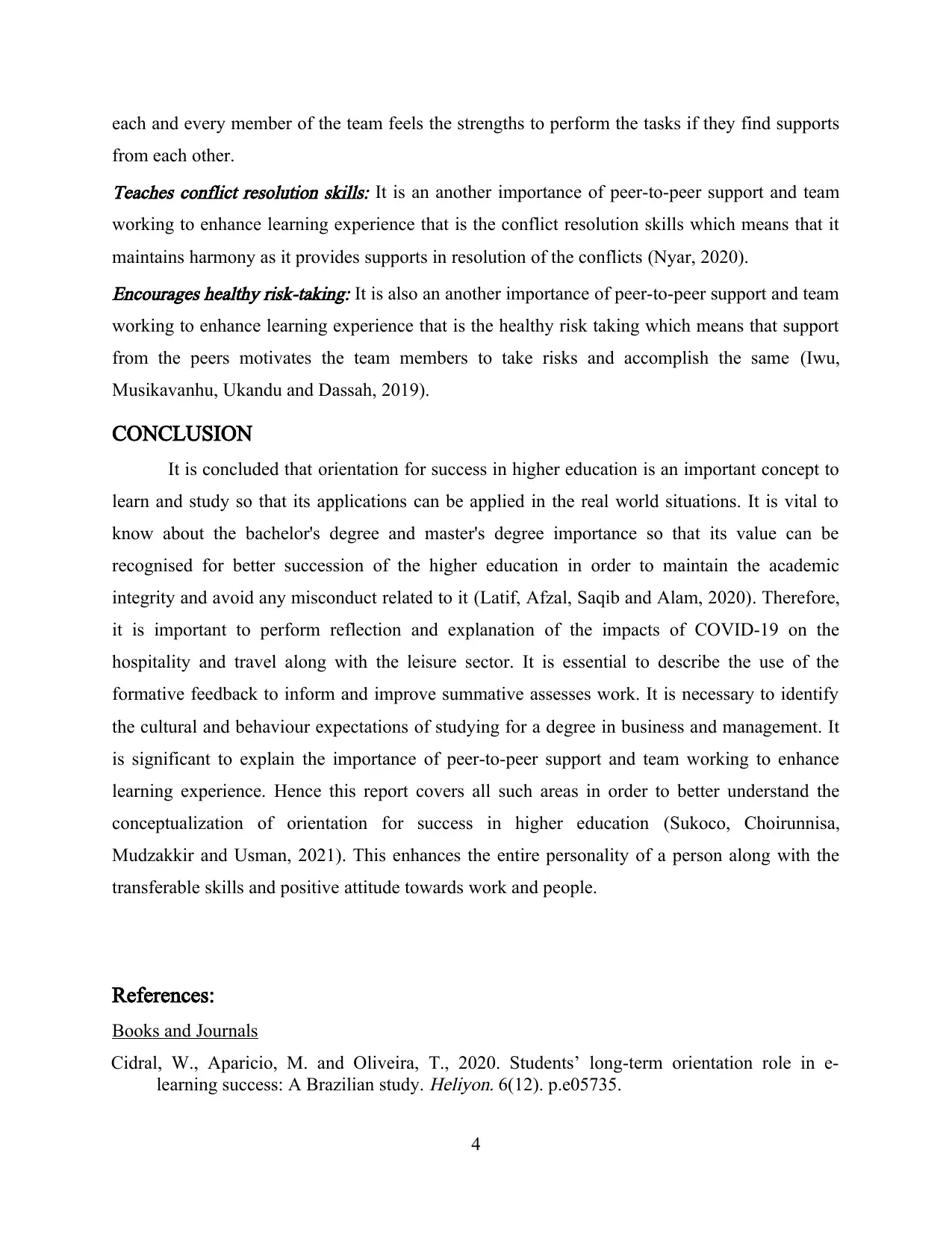
each and every member of the team feels the strengths to perform the tasks if they find supports
from each other.Teaches conflict resolution skills: It is an another importance of peer-to-peer support and team
working to enhance learning experience that is the conflict resolution skills which means that it
maintains harmony as it provides supports in resolution of the conflicts (Nyar, 2020).Encourages healthy risk-taking: It is also an another importance of peer-to-peer support and team
working to enhance learning experience that is the healthy risk taking which means that support
from the peers motivates the team members to take risks and accomplish the same (Iwu,
Musikavanhu, Ukandu and Dassah, 2019).
CONCLUSION
It is concluded that orientation for success in higher education is an important concept to
learn and study so that its applications can be applied in the real world situations. It is vital to
know about the bachelor's degree and master's degree importance so that its value can be
recognised for better succession of the higher education in order to maintain the academic
integrity and avoid any misconduct related to it (Latif, Afzal, Saqib and Alam, 2020). Therefore,
it is important to perform reflection and explanation of the impacts of COVID-19 on the
hospitality and travel along with the leisure sector. It is essential to describe the use of the
formative feedback to inform and improve summative assesses work. It is necessary to identify
the cultural and behaviour expectations of studying for a degree in business and management. It
is significant to explain the importance of peer-to-peer support and team working to enhance
learning experience. Hence this report covers all such areas in order to better understand the
conceptualization of orientation for success in higher education (Sukoco, Choirunnisa,
Mudzakkir and Usman, 2021). This enhances the entire personality of a person along with the
transferable skills and positive attitude towards work and people.
References:
Books and Journals
Cidral, W., Aparicio, M. and Oliveira, T., 2020. Students’ long-term orientation role in e-
learning success: A Brazilian study.
Heliyon. 6(12). p.e05735.
4
from each other.Teaches conflict resolution skills: It is an another importance of peer-to-peer support and team
working to enhance learning experience that is the conflict resolution skills which means that it
maintains harmony as it provides supports in resolution of the conflicts (Nyar, 2020).Encourages healthy risk-taking: It is also an another importance of peer-to-peer support and team
working to enhance learning experience that is the healthy risk taking which means that support
from the peers motivates the team members to take risks and accomplish the same (Iwu,
Musikavanhu, Ukandu and Dassah, 2019).
CONCLUSION
It is concluded that orientation for success in higher education is an important concept to
learn and study so that its applications can be applied in the real world situations. It is vital to
know about the bachelor's degree and master's degree importance so that its value can be
recognised for better succession of the higher education in order to maintain the academic
integrity and avoid any misconduct related to it (Latif, Afzal, Saqib and Alam, 2020). Therefore,
it is important to perform reflection and explanation of the impacts of COVID-19 on the
hospitality and travel along with the leisure sector. It is essential to describe the use of the
formative feedback to inform and improve summative assesses work. It is necessary to identify
the cultural and behaviour expectations of studying for a degree in business and management. It
is significant to explain the importance of peer-to-peer support and team working to enhance
learning experience. Hence this report covers all such areas in order to better understand the
conceptualization of orientation for success in higher education (Sukoco, Choirunnisa,
Mudzakkir and Usman, 2021). This enhances the entire personality of a person along with the
transferable skills and positive attitude towards work and people.
References:
Books and Journals
Cidral, W., Aparicio, M. and Oliveira, T., 2020. Students’ long-term orientation role in e-
learning success: A Brazilian study.
Heliyon. 6(12). p.e05735.
4
⊘ This is a preview!⊘
Do you want full access?
Subscribe today to unlock all pages.

Trusted by 1+ million students worldwide
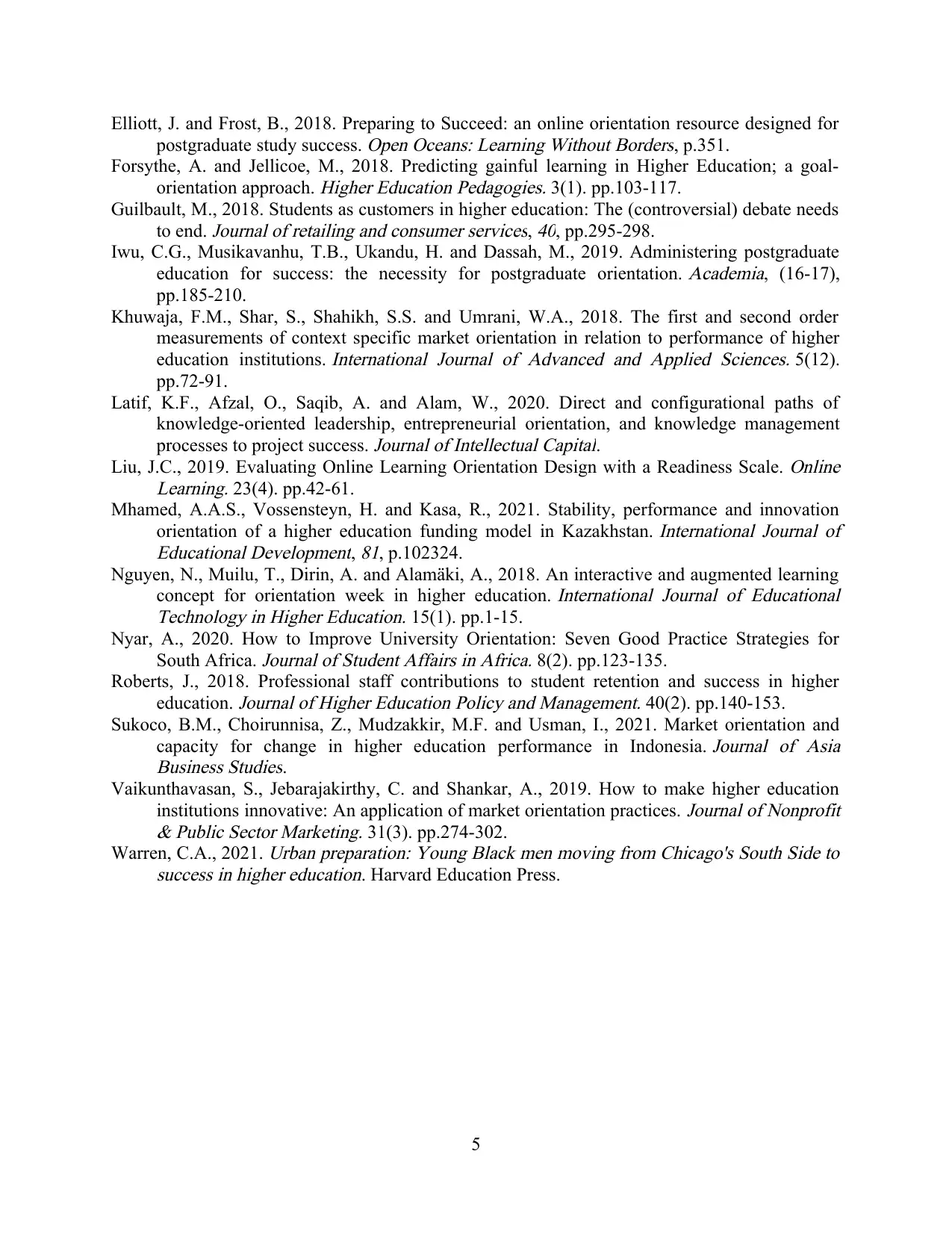
Elliott, J. and Frost, B., 2018. Preparing to Succeed: an online orientation resource designed for
postgraduate study success.
Open Oceans: Learning Without Borders, p.351.
Forsythe, A. and Jellicoe, M., 2018. Predicting gainful learning in Higher Education; a goal-
orientation approach.
Higher Education Pedagogies. 3(1). pp.103-117.
Guilbault, M., 2018. Students as customers in higher education: The (controversial) debate needs
to end.
Journal of retailing and consumer services,
40, pp.295-298.
Iwu, C.G., Musikavanhu, T.B., Ukandu, H. and Dassah, M., 2019. Administering postgraduate
education for success: the necessity for postgraduate orientation.
Academia, (16-17),
pp.185-210.
Khuwaja, F.M., Shar, S., Shahikh, S.S. and Umrani, W.A., 2018. The first and second order
measurements of context specific market orientation in relation to performance of higher
education institutions.
International Journal of Advanced and Applied Sciences. 5(12).
pp.72-91.
Latif, K.F., Afzal, O., Saqib, A. and Alam, W., 2020. Direct and configurational paths of
knowledge-oriented leadership, entrepreneurial orientation, and knowledge management
processes to project success.
Journal of Intellectual Capital.
Liu, J.C., 2019. Evaluating Online Learning Orientation Design with a Readiness Scale.
Online
Learning. 23(4). pp.42-61.
Mhamed, A.A.S., Vossensteyn, H. and Kasa, R., 2021. Stability, performance and innovation
orientation of a higher education funding model in Kazakhstan.
International Journal of
Educational Development,
81, p.102324.
Nguyen, N., Muilu, T., Dirin, A. and Alamäki, A., 2018. An interactive and augmented learning
concept for orientation week in higher education.
International Journal of Educational
Technology in Higher Education. 15(1). pp.1-15.
Nyar, A., 2020. How to Improve University Orientation: Seven Good Practice Strategies for
South Africa.
Journal of Student Affairs in Africa. 8(2). pp.123-135.
Roberts, J., 2018. Professional staff contributions to student retention and success in higher
education.
Journal of Higher Education Policy and Management. 40(2). pp.140-153.
Sukoco, B.M., Choirunnisa, Z., Mudzakkir, M.F. and Usman, I., 2021. Market orientation and
capacity for change in higher education performance in Indonesia.
Journal of Asia
Business Studies.
Vaikunthavasan, S., Jebarajakirthy, C. and Shankar, A., 2019. How to make higher education
institutions innovative: An application of market orientation practices.
Journal of Nonprofit
& Public Sector Marketing. 31(3). pp.274-302.
Warren, C.A., 2021.
Urban preparation: Young Black men moving from Chicago's South Side to
success in higher education. Harvard Education Press.
5
postgraduate study success.
Open Oceans: Learning Without Borders, p.351.
Forsythe, A. and Jellicoe, M., 2018. Predicting gainful learning in Higher Education; a goal-
orientation approach.
Higher Education Pedagogies. 3(1). pp.103-117.
Guilbault, M., 2018. Students as customers in higher education: The (controversial) debate needs
to end.
Journal of retailing and consumer services,
40, pp.295-298.
Iwu, C.G., Musikavanhu, T.B., Ukandu, H. and Dassah, M., 2019. Administering postgraduate
education for success: the necessity for postgraduate orientation.
Academia, (16-17),
pp.185-210.
Khuwaja, F.M., Shar, S., Shahikh, S.S. and Umrani, W.A., 2018. The first and second order
measurements of context specific market orientation in relation to performance of higher
education institutions.
International Journal of Advanced and Applied Sciences. 5(12).
pp.72-91.
Latif, K.F., Afzal, O., Saqib, A. and Alam, W., 2020. Direct and configurational paths of
knowledge-oriented leadership, entrepreneurial orientation, and knowledge management
processes to project success.
Journal of Intellectual Capital.
Liu, J.C., 2019. Evaluating Online Learning Orientation Design with a Readiness Scale.
Online
Learning. 23(4). pp.42-61.
Mhamed, A.A.S., Vossensteyn, H. and Kasa, R., 2021. Stability, performance and innovation
orientation of a higher education funding model in Kazakhstan.
International Journal of
Educational Development,
81, p.102324.
Nguyen, N., Muilu, T., Dirin, A. and Alamäki, A., 2018. An interactive and augmented learning
concept for orientation week in higher education.
International Journal of Educational
Technology in Higher Education. 15(1). pp.1-15.
Nyar, A., 2020. How to Improve University Orientation: Seven Good Practice Strategies for
South Africa.
Journal of Student Affairs in Africa. 8(2). pp.123-135.
Roberts, J., 2018. Professional staff contributions to student retention and success in higher
education.
Journal of Higher Education Policy and Management. 40(2). pp.140-153.
Sukoco, B.M., Choirunnisa, Z., Mudzakkir, M.F. and Usman, I., 2021. Market orientation and
capacity for change in higher education performance in Indonesia.
Journal of Asia
Business Studies.
Vaikunthavasan, S., Jebarajakirthy, C. and Shankar, A., 2019. How to make higher education
institutions innovative: An application of market orientation practices.
Journal of Nonprofit
& Public Sector Marketing. 31(3). pp.274-302.
Warren, C.A., 2021.
Urban preparation: Young Black men moving from Chicago's South Side to
success in higher education. Harvard Education Press.
5
1 out of 7
Related Documents
Your All-in-One AI-Powered Toolkit for Academic Success.
+13062052269
info@desklib.com
Available 24*7 on WhatsApp / Email
![[object Object]](/_next/static/media/star-bottom.7253800d.svg)
Unlock your academic potential
Copyright © 2020–2026 A2Z Services. All Rights Reserved. Developed and managed by ZUCOL.




